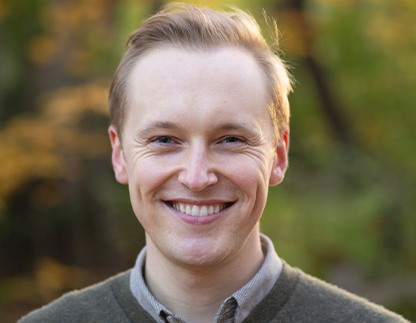I hope that my work can contribute to reforms of policies that dictate what counts as legitimate evidence and who has the authority to interpret it.”
Clay Davis
PhD Candidate in Sociology

Clay Davis is a PhD candidate in Sociology in the Weinberg College of Arts and Sciences. His research examines how democratic societies resolve conflicts over expertise and how policymakers interpret uncertain evidence. Clay is the recipient of a Doctoral Dissertation Research Improvement Grant from the National Science Foundation, which supports his work in studying the use of meta-analysis in medicine, law, and global health policy.
How would you describe your research and/or work to a non-academic audience?
I study how, as a democratic society, we decide who counts as an expert, whose knowledge matters, and what we do when the facts are uncertain. I answer these questions by looking at moments when social conflicts are reproduced in debates over science and technology. I have researched how a group of people with type 1 diabetes challenged the FDA and medical device manufacturers by engineering an “open-source artificial pancreas” and how epidemiologists and HIV/AIDS activists debated what research questions matter when designing a protocol to study the then-new HIV prevention drug PrEP.
My dissertation takes these questions into the halls of government itself, where I study how policymakers use statistics to complement, and at times supplant, traditional democratic mechanisms. I focus on how surgeons, judges, and global health non-governmental organizations (NGOs) use meta-analysis, a tool for combining the results quantitative research, to make tough decisions about when to operate, whether to sentence defendants, and how to allocate scarce medical resources. I call the form of deliberation permitted by statistics like meta-analysis “P-value politics.”
What is the biggest potential impact or implication of your work?
My work contributes to broader debates about various publics’ trust in science. I intend for my research to shed light on the fact that even scientifically informed decision-making is often uncertain, and that lay people have the capacity to weigh in before the facts are settled. I think a government that takes seriously the contributions of its citizens to technical debates is best poised to gain their trust.
Practically, I hope that my work can contribute to reforms of policies that dictate what counts as legitimate evidence and who has the authority to interpret it. I am currently studying the U.S. federal district courts, for example, and have found that complex forms of statistical evidence exacerbate a preexisting bias toward defendants in tort cases. I plan to contribute a clearer understanding of where this disparity comes from so that it can be addressed. I also think my study of the group of people with type 1 diabetes, in which I identified strategies that patients and their families used to develop long-term relationships with researchers and regulators, offers a model for how patients can play an active role in biomedical innovation.
What books are on your bedside table?
I recently read Trust by Hernan Diaz, I’m currently reading Thomas Pynchon’s The Crying of Lot 49, and I’d like to read Jon Fosse’s Septology trilogy. I like that these novels tell stories from multiple points of view, explore how people find meaning in chaos, and manipulate style to control the reader’s pace, respectively.
What did you originally want to be when you grew up?
I wanted to be an ornithologist and, years later, I wanted to be an architect. I still have an interest in design and how spaces influence our thoughts, behaviors, and interactions. And, of course, I will always love birds and other animals!
What advice would you give your younger self or someone considering a similar path?
I would tell them to pursue a wide range of interests, to start research early, to find a dedicated faculty mentor and, most importantly, to read broadly outside of their discipline. I think my ability to speak the language of biology, owing to my interdisciplinary undergraduate degree, has helped me trace how conflicts over expertise unfold. And I know that the generosity of my mentors has given me the confidence to submit my research to journals early in my career. Above all, my love of reading has given me the tools to communicate my research in a way that speaks to questions that capture popular interest.
Tell us about a current achievement or something you're working on that excites you.
I recently won a Doctoral Dissertation Research Improvement Grant from the National Science Foundation to collect data for my research. I have been using this grant to fund travel abroad to observe how non-governmental organizations train their staff to interpret statistical evidence and how researchers debate controversies in global health and development with the language of P-values. I look forward to traveling to Delhi, India in September, for example, to visit the archives of the Indian Institute for Statistics where scholars have applied tools like meta-analysis to state-building projects. I have also used the NSF grant to obtain large swaths of records from federal courts that hold clues to how judges apply ambiguous standards of evidence.
Publish Date: January 14, 2024
If you know a graduate student, postdoctoral scholar, graduate faculty member, staff member, or a member of our TGS alumni population who would make a great candidate for our TGS Spotlight Series, please complete this brief TGS Spotlight Series Nomination Form.